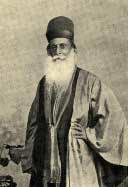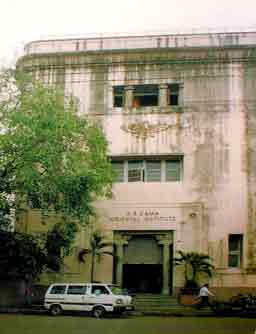|

The
microscopic Parsi community has given India men of light and leading in
every walk of human endeavor. One such man was Khurshedji Rustomji Cama
whose hundred and seventieth birth anniversary was celebrated by his
co-religionists on November 10, 2000.
Born
in an aristocratic family Khurshedji Cama like his two contemporaries
Dadabhai Navroji and Behramji Malbari was an ardent and life long advocate
of education and social reform. He believed in the magic of education and
maintained that education was the salvation of his nation.
He
however, concentrated all his energy and efforts on religious education of
the Parsi priests and social and religious reforms.
In
their long history of nearly four thousand years the Zarathushtrians have
suffered untold calamity. Invaders like Alexander, the Arabs and Changis
Khan, Halaku Khan and Timur the Lame devastated Iran and destroyed its
religious temples and literature. Time and again, the genocide was complete.
So much so that almost all religious books, men who knew and spoke the
Pahlavi language were put to the sword. Even the Persian language became a
thing of the hut. For several thousand years the Zarathushtrians preserved
their scripture in memory and passed them down from heart to heart.
The
Parsis left Iran,
leaving behind all their earthly possessions to save their religion.
Naturally, their interpretation and understanding of their great religion
left a great deal to be desired. Khurshedji Cama was quick to realize this
fact, and set out to clean this Augean stable. How he accomplished this
Herculean task can be understood by a birdís eye view of his life.
In the
18th century, French scholar Anquitel Du Perrom traveled to India
and stayed in Surat. He collected available manuscripts of all scriptures
and carried them to France. Scholars and savants of France and Germany
interpreted and translated them with the help of comparative grammar of
Sanskrit and Avesta, Philology, Etymology.
Khurshedji Cama who was running his own business in London and Liverpool
visited France and Germany mastered those languages and interpreted our
scriptures with the magic key of the new sciences. He studied with profound
scholars of Europe. Equipped with this knowledge and learning, he returned to
India.
Thus, the ancient lore of our scriptures went to
Europe. There it was interpreted and translated with the new
sciences. Destiny had ordained that this ancient knowledge should come back
to India
and enlighten the followers of Spitman Zarathushtra.
Khurshedji Cama, was that man destined to preach and propagate that
knowledge to Zarathushtrian priests in India.
This
was no easy task, the Parsis, living for centuries according to old customs
and tradition and scanty knowledge of their scriptures put up serious
opposition. Khurshedji Cama was undeterred by this reaction. With saintly
spirit of forbearance and forgiveness, he overlooked opposition, criticism
and even insults.
He
introduced study classes in Mulla Feroze Madressa and other institutions,
trained young priests who responded readily and heartily and joined
Khurshedji Cama in his noble mission. This in brief is the account of Cama's
great mission. Those who came to cavil remained to pray.
Khurshedji Cama's great achievement is aptly summed up by the famed German
scholar and savant Prof. Darmesterer, when he dubbed him as "Lay Dastur".
Cama
knew nearly a dozen languages, oriental and occidental, ancient and modern.
He was an eloquent and impressive orator in English and Gujarati. He had to
his credit nearly a dozen learned books, a number of treatises. His
Zarathustra Namch is a masterly piece of research, which throws new light on
the subjects. Scholars of the West, who looked askance at other works on the
subject unanimously and readily acclaimed his book as a masterpiece.
Cama
was a great reformer in matters of education and religion. He was neither a
sectarian nor an orthodox. He had an open mind. He welcomed criticism and
answered it with facts and figures.
 |
|
K.R. Cama Institute building
houses one of the most extensive collections of Zarathushtrian
literature old and new; it is a center dedicated to research and
learning, Mumbai, India. |
If modern science seemed to run counter to our scriptures and the orthodox
were reluctant about accepting it, Khurshedji Cama tackled the problem
systematically and convincingly. An example would not come amiss. In
1897-98, plague ravaged
India,
Prof. Haffkine prepared anti-plague serum. The orthodox and particularly the
priestly class hesitated to use it. Their problem was that the serum was
perhaps not mentioned in the Vendidad. Cama studied the problem in its
entirety. He interviewed the scientist in charge of preparing the serum at
Haffkine Institute and questioned him at length about the method of
preparing the serum. Equipped with these details and his masterly knowledge
of the Vendidad, he addressed a meeting convened by the Trustees of the
B.P.P. (Bombay Parsi Panchayat) at Dadi Seth Agiary in
Fort
Bombay. He convinced the gathering that the use of the serum was life saving
and in no way infringed the commandments of the Vendidad. He never
subscribed to the notion of forcing any idea upon persons. Facts and
figures, convincing arguments did the trick for him.
Khurshedji Cama was opposed to the excesses and extravagance that were
committed in the name of religion. He pointed out that the notion that such
ceremonies enhanced the status of the departed ones in the next world was
false, misleading and against original concept. He pointed out in his
lectures and writings that these ceremonies were meant to recall the
memories of the dear departed ones, to remember and respect them and to show
our gratitude to them. The status of the departed one in the other world be
judged and decided by his life in this world. This controversy went on
relentlessly for some time.
Just
then the government declared that trusts created for performing such
ceremonies aimed at perpetuating them, and so such trusts were not legally
valid. A meeting was convened to urge the government to give relief to the
Parsis in the matter. Cama knew fully well that such a relief would not be
granted. He himself was a bitter opponent of this practice because it had
deviated and deteriorated from its original purpose.
All
the same, at the meeting, to the astonishment of his friends, Cama stood up
to move the first resolution urging the government to give relief. He
explained that the original Avestan edict was noble and laudable. If by same
via media suggested by the government itself, it could be salvaged and
restricted and it justified its purpose, we should work for it.
Here
was a man who had an open mind and adherence to our ancient customs and yet
he was always for removing rust accumulated by time and requesting blind
following of a custom, which had deteriorated. He was a reformist with a
difference.
It is
well said that there are sermons in some lives. Cama's life was one such. As
a true Zarathushtrian, he was an optimist, Difficulties never daunted or
dithered him. With complete self-confidence he faced and overcame them all.
He instilled hope and courage into those who were dejected and despaired. He
always cheered them with "You will survive all that".
The spirit of tolerance
and forgiveness formulated his life. He never bore a grudge nor ever stood
on dignity. He was always ready to join hands with his opponents on points
of agreement. It was the cause that mattered, and to serve it, he was always
ready to sink his ego.
For
the invaluable services rendered by him to the correct interpretation and
understanding of our religion epithets like Asho Nar, Ratu or Rainidar come
to our mind. But K.R. Cama himself would have depreciated and forbidden the
use of such words. Prof. Darmesteter called him the "Lay Dastur" and he said
so much in awarding the accolade. That about sums up the man and his great
services to the community and the religion. |